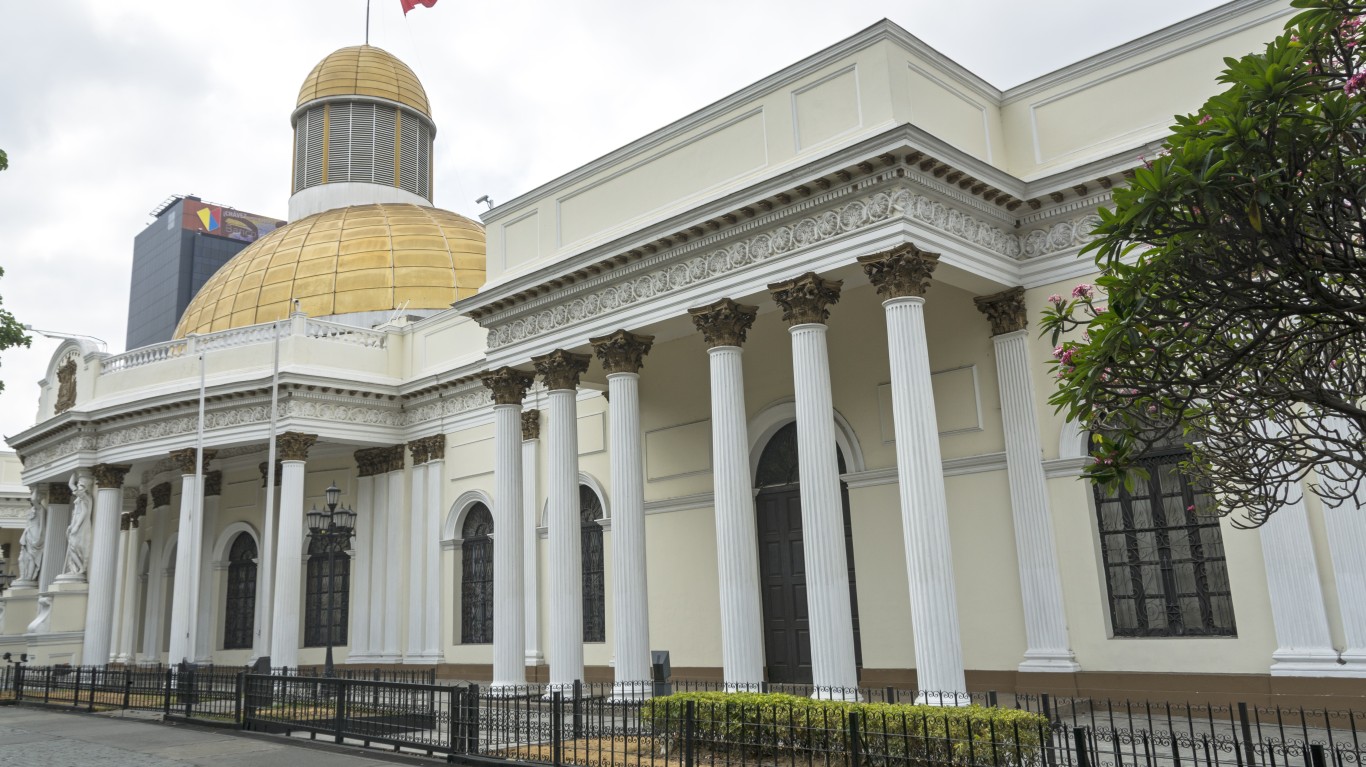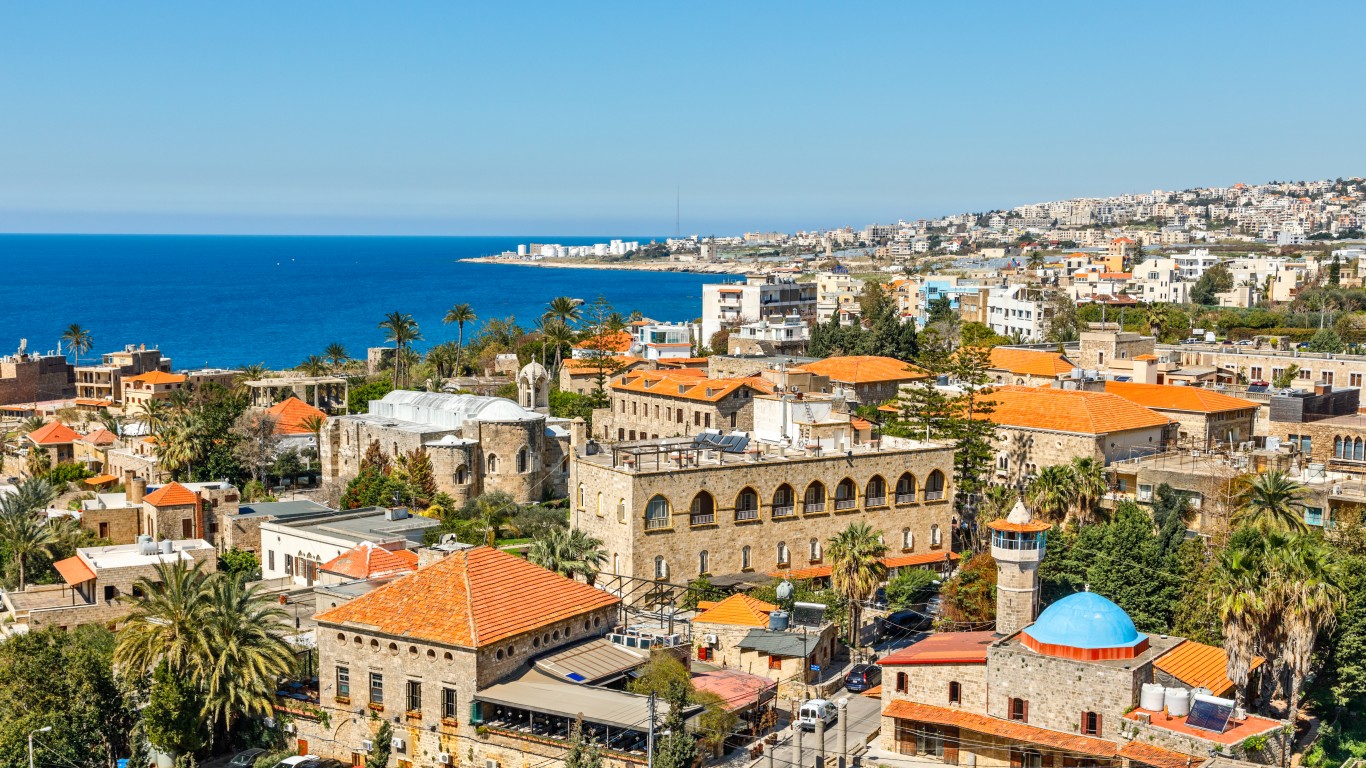Special Report
These Countries Have Most of the World's Gold

Published:
Last Updated:

Last year was the strongest year for gold demand since 2011, and demand was high largely because of purchases by central banks. Annual gold demand jumped 18% to 4,741 metric tons, aided by record fourth quarter demand of 1,337 metric tons, according to the World Gold Council. In all, central banks own over 35 million metric tons of gold, or about a fifth of gold ever mined.
While in good times gold may be snubbed in favor of higher yield investments and assets, in times of volatility and high inflation it is considered as an effective hedge. Though the system fixing the currency to gold was abandoned in 1973, central banks continue to hold gold for a variety of reasons, including to trade it, diversify their holdings, and to use it as collateral. (Also see, 40 countries spending the most on war.)
In recent years, central banks have once again become net purchasers of gold. And in 2022, the majority of the central bank buying came from emerging markets, with Turkey the largest buyer. Still, despite its buying spree, Turkey owns the 11th largest gold reserves.
To determine the countries that own the world’s gold, 24/7 Wall St. reviewed data on gold reserves from the World Gold Council. Countries were ranked based on total gold reserves as of Dec. 31, 2022. Data on the value of gold reserves is also from the WGC and was calculated using the LBMA (London Bullion Market Association) Gold Price per kilo for the fourth quarter of 2022. Supplemental data on GDP and population are from the World Bank and are for 2021.
Probably not surprising given the country’s position as the leading global economic power, the United States owns, by far, the most gold reserves at 8,133.1 metric tons. In fact, the U.S. holds nearly as many gold reserves as the next three countries combined – Germany, Italy, and France. Russia rounds out the top five with 2,299.1 metric tons. (Here are the countries that receive the most aid from the USA.)
While the U.S. and European countries make up most of the top 10 gold reserve holders, three Asian countries are also in the top 10 – China (No. 6), Japan (No. 8), and India (No. 9). The next 10 countries that own the most gold are actually mostly emerging markets. One entity not included is the International Monetary Fund, which holds 2,814.1 metric tons.
Click here to see the countries with the most gold.

25. Venezuela
> Gold reserves as of Dec. 31, 2022: 161.1 metric tons (0.5% of world total)
> Value of gold reserves: $9.4 billion
> National GDP, 2021: $200.0 billion
> Population, 2021: 28.2 million
[in-text-ad]

24. Algeria
> Gold reserves as of Dec. 31, 2022: 174.1 metric tons (0.5% of world total)
> Value of gold reserves: $10.1 billion
> National GDP, 2021: $163.0 billion
> Population, 2021: 44.2 million

23. Belgium
> Gold reserves as of Dec. 31, 2022: 227.1 metric tons (0.7% of world total)
> Value of gold reserves: $13.3 billion
> National GDP, 2021: $594.1 billion
> Population, 2021: 11.6 million

22. Poland
> Gold reserves as of Dec. 31, 2022: 229.1 metric tons (0.7% of world total)
> Value of gold reserves: $13.3 billion
> National GDP, 2021: $679.4 billion
> Population, 2021: 37.7 million
[in-text-ad-2]

21. Thailand
> Gold reserves as of Dec. 31, 2022: 244.1 metric tons (0.8% of world total)
> Value of gold reserves: $14.2 billion
> National GDP, 2021: $505.9 billion
> Population, 2021: 71.6 million

20. Austria
> Gold reserves as of Dec. 31, 2022: 280.1 metric tons (0.9% of world total)
> Value of gold reserves: $16.3 billion
> National GDP, 2021: $480.4 billion
> Population, 2021: 9.0 million
[in-text-ad]

19. Spain
> Gold reserves as of Dec. 31, 2022: 282.1 metric tons (0.9% of world total)
> Value of gold reserves: $16.4 billion
> National GDP, 2021: $1.4 trillion
> Population, 2021: 47.4 million

18. Lebanon
> Gold reserves as of Dec. 31, 2022: 287.1 metric tons (0.9% of world total)
> Value of gold reserves: $16.7 billion
> National GDP, 2021: $23.1 billion
> Population, 2021: 5.6 million

17. United Kingdom
> Gold reserves as of Dec. 31, 2022: 310.1 metric tons (1.0% of world total)
> Value of gold reserves: $18.1 billion
> National GDP, 2021: $3.1 trillion
> Population, 2021: 67.3 million
[in-text-ad-2]

16. Saudi Arabia
> Gold reserves as of Dec. 31, 2022: 323.1 metric tons (1.0% of world total)
> Value of gold reserves: $18.8 billion
> National GDP, 2021: $833.5 billion
> Population, 2021: 36.0 million

15. Kazakhstan
> Gold reserves as of Dec. 31, 2022: 352.1 metric tons (1.1% of world total)
> Value of gold reserves: $20.5 billion
> National GDP, 2021: $197.1 billion
> Population, 2021: 19.0 million
[in-text-ad]

14. Portugal
> Gold reserves as of Dec. 31, 2022: 383.1 metric tons (1.2% of world total)
> Value of gold reserves: $22.3 billion
> National GDP, 2021: $253.7 billion
> Population, 2021: 10.3 million

13. Uzbekistan
> Gold reserves as of Dec. 31, 2022: 396.1 metric tons (1.3% of world total)
> Value of gold reserves: $23.1 billion
> National GDP, 2021: $69.2 billion
> Population, 2021: 34.9 million

12. Taiwan
> Gold reserves as of Dec. 31, 2022: 424.1 metric tons (1.3% of world total)
> Value of gold reserves: $24.7 billion
> National GDP, 2021: $828.6 billion
> Population, 2021: 23.6 million
[in-text-ad-2]

11. Turkey
> Gold reserves as of Dec. 31, 2022: 542.1 metric tons (1.7% of world total)
> Value of gold reserves: $31.6 billion
> National GDP, 2021: $819.0 billion
> Population, 2021: 84.8 million

10. Netherlands
> Gold reserves as of Dec. 31, 2022: 612.1 metric tons (1.9% of world total)
> Value of gold reserves: $35.7 billion
> National GDP, 2021: $1.0 trillion
> Population, 2021: 17.5 million
[in-text-ad]

9. India
> Gold reserves as of Dec. 31, 2022: 787.1 metric tons (2.5% of world total)
> Value of gold reserves: $45.9 billion
> National GDP, 2021: $3.2 trillion
> Population, 2021: 1.4 billion

8. Japan
> Gold reserves as of Dec. 31, 2022: 846.1 metric tons (2.7% of world total)
> Value of gold reserves: $49.3 billion
> National GDP, 2021: $4.9 trillion
> Population, 2021: 125.7 million

7. Switzerland
> Gold reserves as of Dec. 31, 2022: 1,040.1 metric tons (3.3% of world total)
> Value of gold reserves: $60.6 billion
> National GDP, 2021: $800.6 billion
> Population, 2021: 8.7 million
[in-text-ad-2]

6. China
> Gold reserves as of Dec. 31, 2022: 2,011.1 metric tons (6.4% of world total)
> Value of gold reserves: $117.2 billion
> National GDP, 2021: $17.7 trillion
> Population, 2021: 1.4 billion

5. Russia
> Gold reserves as of Dec. 31, 2022: 2,299.1 metric tons (7.3% of world total)
> Value of gold reserves: $134.0 billion
> National GDP, 2021: $1.8 trillion
> Population, 2021: 143.4 million
[in-text-ad]

4. France
> Gold reserves as of Dec. 31, 2022: 2,437.1 metric tons (7.7% of world total)
> Value of gold reserves: $142.1 billion
> National GDP, 2021: $3.0 trillion
> Population, 2021: 67.7 million
3. Italy
> Gold reserves as of Dec. 31, 2022: 2,452.1 metric tons (7.8% of world total)
> Value of gold reserves: $143.0 billion
> National GDP, 2021: $2.1 trillion
> Population, 2021: 59.1 million

2. Germany
> Gold reserves as of Dec. 31, 2022: 3,355.1 metric tons (10.6% of world total)
> Value of gold reserves: $195.7 billion
> National GDP, 2021: $4.3 trillion
> Population, 2021: 83.2 million
[in-text-ad-2]

1. United States
> Gold reserves as of Dec. 31, 2022: 8,133.1 metric tons (25.8% of world total)
> Value of gold reserves: $474.3 billion
> National GDP, 2021: $23.3 trillion
> Population, 2021: 331.9 million
Start by taking a quick retirement quiz from SmartAsset that will match you with up to 3 financial advisors that serve your area and beyond in 5 minutes, or less.
Each advisor has been vetted by SmartAsset and is held to a fiduciary standard to act in your best interests.
Here’s how it works:
1. Answer SmartAsset advisor match quiz
2. Review your pre-screened matches at your leisure. Check out the advisors’ profiles.
3. Speak with advisors at no cost to you. Have an introductory call on the phone or introduction in person and choose whom to work with in the future
Thank you for reading! Have some feedback for us?
Contact the 24/7 Wall St. editorial team.